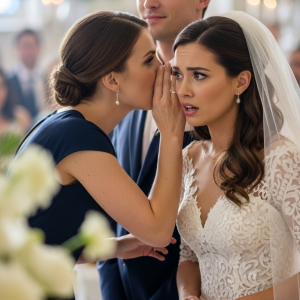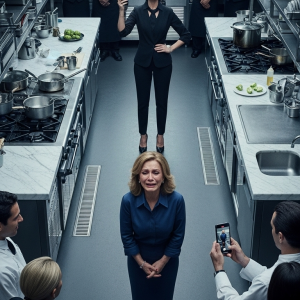My name is Gigi, and my life was torn apart when I was twenty-five and two months pregnant with my second child. My husband, Jack, and I had been together for eight years, our lives built around our daughter, Naomi, and the dream of a growing family. That dream shattered the day I saw the text messages on his phone.
He was having an affair with his coworker, Suzanne. When I confronted him, my hands shaking and tears streaming down my face, the truth he offered was a second, more devastating blow. Suzanne was also pregnant with his child. The shock was so immense, the room tilted, and I nearly collapsed.
The weeks that followed were a blur of arguments and heartache. My mother-in-law, a woman I adored, came to stay with me, her presence a steady anchor in my storm. But the stress was relentless, a constant pressure on my heart and my body. Eventually, the unimaginable happened: I miscarried.
When I told Jack we had lost our child, I expected grief, or at the very least, comfort. Instead, he was cold, his eyes empty of sorrow. He blamed me for the loss, packed a bag, and walked out of my life to be with Suzanne. His departure, in the shadow of our shared tragedy, was a cruelty I never thought possible. Thankfully, his mother stayed, taking care of Naomi so I could grieve in peace.
Our divorce was contentious. Jack fought against paying child support and made it painfully clear he wanted nothing more to do with me or Naomi. He willingly gave up full custody, a decision that broke my heart for our daughter. The only connection he maintained was the court-ordered monthly payment; he never once tried to visit or call.
Throughout this turmoil, my parents and my ex-mother-in-law, Eleanor, were my unwavering support system. Our families had been friends for decades, which was how Jack and I first met. When Eleanor learned of Jack’s affair, she was furious with him. She vowed to never speak to him again if he left me, and warned him she wanted nothing to do with his affair partner or their child.
It was a shocking promise, but one she kept until the day she died. She faced immense pressure from her own family, who urged her to forgive her only son and embrace her new grandson. When she refused, they began excluding her from family events, choosing to invite Jack and Suzanne instead. I felt a terrible guilt for the rift I had inadvertently caused, but she always reassured me. “You are my child, too, Gigi,” she would say. “I will not abandon you.”
Years passed, and Eleanor’s health began to fail, leaving her unable to walk or care for herself. Without hesitation, I invited her to move in with us permanently. We hired a caregiver for the mornings, and I took over in the evenings. My daughter, Naomi, was thrilled to have her grandma with us, and our home was filled with a unique, multi-generational warmth.
One evening, as we sat together, Eleanor revealed something that stunned me. She told me that the day Jack left me, she had gone straight to her lawyer to amend her will. Originally, as her only child, Jack was set to inherit everything. But she had made a significant change.
“This house, and my life insurance, will go to Naomi,” she explained, her voice firm. “A large portion of my savings and the family heirlooms will go to you, Gigi. I trust you to safeguard them for her.” She explained that my ex-husband would only inherit her car and his late father’s art collection. It was a gesture of profound trust and love.
A wave of conflicting emotions washed over me: gratitude, shock, and a deep sadness for the broken family she was leaving behind. I urged her to reconsider, telling her I would understand if she wanted to include Jack’s son. “No,” she insisted. “Despite the divorce, you are the only wife of my son I will ever recognize. This house belongs to Naomi. The legacy stays with her.” I understood her reasoning and accepted her decision.
Throughout her time with me, Jack never once called to ask about his mother’s health. He simply didn’t care. His indifference was a constant, aching reminder of the man he had become.
One night, Eleanor had severe breathing difficulties, and I rushed her to the hospital. After that health scare, a sense of urgency settled over me. I couldn’t let her pass away without giving Jack one last chance to make amends. I called him, setting aside our differences, and begged him to visit his dying mother.
He argued, complaining that his mother had never formed a relationship with Suzanne or his son. It was disheartening to hear his ego take precedence over his mother’s fragile health. After much persuasion, he reluctantly agreed to a brief visit. To my shock, he arrived with Suzanne in tow. I held my tongue for Eleanor’s sake, but my heart sank.
The visit was painfully awkward. Jack spoke in measured tones, avoiding any real conversation. When Eleanor saw Suzanne, she began to protest, but I calmed her down, assuring her it was alright. While I was in the kitchen checking on Naomi, who was visibly hurt that her father hadn’t even acknowledged her, I overheard Suzanne on the phone in the backyard.
The open window carried her laughter as she spoke. “Jack told me his mother is leaving him everything,” she said to the person on the other end. “So the least we can do is visit one last time. I can’t wait to move in and get rid of all this old furniture. She has no taste whatsoever.” She went on, detailing her plans to repaint, remove our pictures, and completely alter the home’s history. Her motives were crystal clear: she was there to secure her inheritance, not to comfort a dying woman. The discovery was sickening, but I chose to keep it to myself to protect Eleanor from more pain.
Eleanor passed away peacefully last week. As she had no one else, my parents and I organized her funeral, ensuring she had the dignified farewell she deserved. Jack attended, but Suzanne did not. A few days later, Eleanor’s lawyer contacted me to finalize the will. The news was overwhelming, a mix of grief for my loss and gratitude for the future she had secured for my daughter.
That evening, there was a knock on my door. It was Jack, Suzanne, and a few of their relatives, their faces grim. “Why did you get everything?” Jack demanded, his voice filled with resentment. “The house, the money, the heirlooms… it all went to you!”
I explained calmly that it was Eleanor’s carefully considered decision, made years ago. He accused me of manipulating a sick old woman, but I pointed out that the will was updated long before her health deteriorated. Suzanne chimed in, questioning why her son was left with nothing.
That’s when I looked her dead in the eye. “Perhaps it’s because my mother-in-law knew you couldn’t wait to get your hands on this house to ‘repaint the walls’ and throw out her things because she had ‘no taste’?” I repeated, word for word, the cruel things I had overheard her say. Her face went pale as Jack stared at her in stunned silence. The relatives, seeing their hopes of a payout vanish, began demanding I sell the property and split the cash. I stood my ground, reminding them that none of them had bothered to visit Eleanor in her final years
Jack, recovering from his shock, threatened to sue me and contest the will. I simply laughed. “Go ahead and waste your money, Jack,” I said. “The will is ironclad. You were a neglectful son, and now you have to live with the consequences.” I reminded him that Eleanor had still left him his father’s valuable art collection, more than enough to provide for his family.
Suzanne began begging, pleading for me to think of her son. “He deserves a good life, just like Naomi,” she cried. I agreed, but asked her if she ever once thought about what Naomi deserved when Jack abandoned her. I told them firmly to leave my house and that the discussion was over. I shut the door on their shocked faces, feeling a profound sense of peace. I had honored Eleanor’s final wishes.
Since then, the calls and angry messages have continued, but they are just noise. Yesterday, Suzanne called and threatened to tell Naomi “the truth” about me if I didn’t share the inheritance. I calmly informed her that if she ever came near my child, I would get a restraining order and contact her employer with evidence of her harassment. The calls have since stopped.
We have moved into Eleanor’s home now. Her presence lingers in every room, a comforting spirit. I miss her terribly, but I find solace in knowing that this house, her sanctuary, will continue to be a haven for her granddaughter. I will carry her spirit with me always, determined to honor the incredible legacy of love she left behind.
Of course. Here is a 1000-word continuation of the story, exploring the complexities of settling into a new life and the final, lingering threads of the past. It is written in English and formatted into short paragraphs for easy reading.
Settling into Eleanor’s home was a bittersweet process. The walls seemed to hold the echo of her warmth, and I found myself moving through the days as if she were just in the next room. I kept her teacup in its usual spot, tended to the rose bushes in her backyard, and told Naomi stories about the strong, loving woman who had been her grandmother.
The house was a sanctuary, but it was also a constant reminder of our loss. One evening, as I was tucking Naomi into bed, she looked up at me with wide, innocent eyes. “Mommy,” she asked quietly, “Why doesn’t Daddy come here anymore? Doesn’t he miss Grandma too?”
The question, so simple and yet so complex, pierced my heart. I sat on the edge of her bed, choosing my words carefully. I explained that sometimes, grown-ups make choices that hurt others, and that even though her father had made his own choices, it didn’t change the fact that she was deeply loved by me, by her grandparents, and by the memory of the grandmother who had given us this home. It was the beginning of a long, delicate conversation, one I knew we would have many times.
Life found a new normal. I focused on raising Naomi and managing the inheritance with a deep sense of responsibility. I established trust funds, invested wisely, and began the preliminary work for a small local scholarship in Eleanor’s name. The angry calls had long since ceased, and I allowed myself to believe that Jack and Suzanne were finally, truly, a part of my past.
About six months after we moved in, a thick, formal-looking envelope arrived in the mail. It was addressed not to me, but to the Executor of Eleanor’s Estate. My heart tensed for a moment, bracing for another unforeseen problem. Inside was a letter from a prestigious art appraisal firm.
The letter concerned the art collection that Jack had inherited from his father. An art dealer, acting on Jack’s behalf, had apparently requested an appraisal for the entire collection with the intent to sell. However, the firm had discovered a specific, unalterable clause in the legal transfer of ownership. It was a detail Eleanor had never mentioned to me.
While Jack was the owner of the collection, there was one critical stipulation. The centerpiece, a stunning landscape painting by a renowned artist and his father’s most prized possession, could not be sold. Eleanor had legally designated it to be held in trust, with Jack as its custodian, until Naomi’s 18th birthday, at which point full ownership would transfer to her. He could sell the other, minor pieces, but the collection’s main source of value was locked away.
A slow smile spread across my face as I read the words. It was Eleanor’s final, brilliant move. It wasn’t just about denying Jack the money; it was a masterstroke of legacy. She had ensured that a piece of his father, the grandfather Naomi would never know, would one day belong to her. She had tethered Jack to the daughter he had abandoned, forcing him into a decade-long role as the guardian of her heritage
It took less than a day for the phone to ring. It was Jack. The anger and entitlement were gone from his voice, replaced by a raw, hollow desperation that was almost unrecognizable. He wasn’t yelling; he was pleading.
“You have to release it, Gigi,” he said, his voice cracking. “You’re the executor. You can undo this. Please. I have nothing left.” He sounded like a man at the absolute end of his rope.
He told me everything. Suzanne had left him weeks ago. The fantasy of a wealthy life had been the glue holding them together, and when that fantasy shattered on my doorstep, their relationship crumbled into bitter accusations. She had drained their shared accounts and disappeared, leaving him with all the debt they had accumulated. The art collection had been his last lifeline, his one chance to start over.
“She’s a child, Gigi. What is she going to do with a painting?” he argued, his desperation making him cruel. “It’s better for Naomi if her father isn’t a complete failure, isn’t it?” He was trying to manipulate me one last time, using our daughter as a bargaining chip for his own salvation. He was asking me to dismantle the final gift Eleanor had so carefully constructed for her granddaughter.
I listened to him, and for a fleeting moment, a sliver of pity pricked at me. He had lost everything, just as I once had. But his losses were the direct result of his own choices, his own greed and cruelty. Mine had been inflicted upon me by him. The pity vanished, replaced by a calm, unshakeable resolve.
“No, Jack,” I said, my voice quiet but firm. “I will not undo it.”
I explained to him, as if speaking to a child, what that painting represented. It wasn’t a financial tool to bail him out of his mistakes. It was a connection to his father. It was a piece of family history. It was the only part of his grandfather that Naomi would ever get to own.
“Your mother wanted Naomi to have that heritage,” I continued. “She trusted you with one final task: to be the caretaker of your daughter’s legacy. It is not for sale. That is the only role you have left in this family. I suggest you learn to live with it.”
Before he could argue further, I hung up the phone. A profound silence filled the room. It was different from all the silences that had come before. It was not the silence of grief or tension or fear. It was the silence of finality. The last thread connecting me to him had been cut. His problems were no longer my concern. My future, and Naomi’s, was entirely our own. Later that day, I found the perfect spot on the living room wall where, one day, Naomi’s painting would hang.




